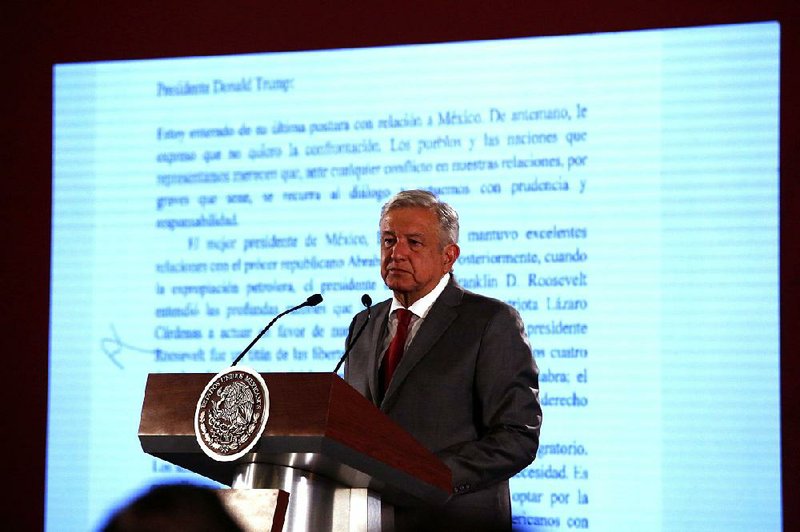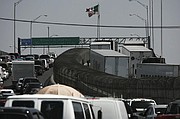WASHINGTON -- President Donald Trump doubled down Friday on his threat to impose a 5% tariff on Mexican imports unless America's southern neighbor cracks down on Central American migrants trying to cross the U.S. border.
Trump's move was met with push-back from U.S. business, Mexico and Capitol Hill.
U.S. manufacturers said the tariff, set to take effect June 10, would have devastating consequences on them and American consumers. U.S. stocks tumbled on Wall Street in response to Trump's planned action.
Mexican President Andres Manuel Lopez Obrador dispatched his foreign secretary, Marcelo Ebrard, to Washington to try to negotiate a solution. He said social problems are not solved with coercive measures, but also seemed convinced that Trump just needed to be informed about all the steps Mexico has taken to slow illegal migration.
"I think that President Trump will understand that this isn't the way in which these things can be resolved," Lopez Obrador said. "I think that there will be a correction, perhaps not immediately, but it will happen, because these measures aren't good for either the Mexicans nor the Americans."
Mexico deported about 15,600 foreigners in May, up from 5,585 in January, according to government figures obtained by Andrew Selee, head of the Migration Policy Institute, a Washington think tank.
Mexico also canceled the "humanitarian visa" program after experiencing overwhelming demand. And it has agreed to a Trump administration request to host migrants seeking U.S. asylum while they go through the application procedures -- a process that can take months.
Selee said the Mexican government has increased its efforts but was struggling to contend with the surge in migrants crossing its territory.
"The Mexican immigration system was not built to deal with these kinds of flows," he said. Complicating matters, he said, the Lopez Obrador government has fired hundreds of employees of the national migration agency for corruption.
"It's the right thing to do," said Selee, but it means the government has fewer officers to detect and detain migrants in Mexico illegally.
The Mexican president has maintained a cordial relationship with Trump despite significant policy differences on immigration and other issues.
He said Friday that Mexico would enforce its immigration laws but would not take actions that violate human rights. He noted that people were leaving Central America "not by choice, but necessity" because of violence and a lack of jobs.
In a Twitter post from the airport, Ebrard wrote that he had spoken with Secretary of State Mike Pompeo and Trump's son-in-law, Jared Kushner, and that "the negotiation process begins." He said he "heard interest and respect" from the two men expressed toward Mexico's president.
Earlier Friday, Ebrard wrote on Twitter that "the treatment of Mexico is unfair and does not make economic sense to anyone."
He added that "Mexico is the main trading partner of the United States. What they receive from our country are essential goods and services, productivity. The flow of migrants from Central America and other countries or the high consumption of narcotics are not the responsibility of Mexico."
U.S. administration officials told reporters in a briefing call Thursday evening that Mexico could prevent the tariffs from kicking in by securing its southern border with Guatemala, cracking down on criminal smuggling organizations, and entering into a "safe third country agreement" that would make it difficult for those who enter Mexico from other countries to claim asylum in the U.S.
"We fully believe they have the ability to stop people coming in from their southern border and if they're able to do that, these tariffs will either not go into place or will be removed after they go into place," said acting White House Chief of Staff Mick Mulvaney.
Trump said the percentage will gradually increase -- up to 25% -- until the migration problem is remedied.
"Mexico has taken advantage of the United States for decades," Trump said in a tweet. "Because of the Dems, our Immigration Laws are BAD. Mexico makes a FORTUNE from the U.S., have for decades, they can easily fix this problem. Time for them to finally do what must be done!"
Trump's decision risks upending other policy priorities, such as the United States-Mexico-Canada Agreement, a trade deal that is the cornerstone of Trump's legislative agenda and seen as beneficial to his re-election effort.
Keeping the economy rolling also is critical to Trump's re-election, and business was not happy with the president's planned tariff on Mexican imports.
"These proposed tariffs would have devastating consequences on manufacturers in America and on American consumers," said Jay Timmons, chief executive officer of the National Association of Manufacturers. "We have taken our concerns to the highest levels of the administration and strongly urge them to consider carefully the impact of this action on working families across this country."
GOP OPPOSITION
Some of Trump's fellow Republicans in Congress opposed the tariff.
Texas Republican Sen. John Cornyn supports the president's commitment to securing the border, an aide said, but he opposes the across-the-board tariff, "which will disproportionately hurt Texas."
Key trade senators also spoke up. Pennsylvania GOP Sen. Pat Toomey, who has questioned the administration's ability to invoke national security threats for some other imports, called the tariff a "blanket tax increase" on items Americans purchases from Mexico and "the wrong remedy."
The tariff threat comes at a peculiar time, given how hard the administration has been pushing for passage of the United States-Mexico-Canada Agreement, which would update the North American Free Trade Agreement.
Sen. Chuck Grassley, R-Iowa, a usual Trump ally and the chairman of the Senate Finance Committee, slammed the president's action, saying it was a "misuse of presidential tariff authority" that would burden American consumers and "seriously jeopardize passage of USMCA."
Sen. Joni Ernst, R-Iowa, said the livelihoods of farmers and producers from her state are at risk and so is the new trade deal.
"If the president goes through with this, I'm afraid progress to get this trade agreement across the finish line will be stifled," she said.
Fears for the domestic fallout of the tariffs were echoed by Democratic lawmakers.
Sen. Kamala Harris, D-Calif., who is running for president in 2020, said the cost of these tariffs is borne by American consumers, not the countries Trump is seeking to punish.
"This is about taxing American consumers," she said in an interview Friday with news outlet Noticias Telemundo. "People are going to have to pay more for washing machines, pay more for clothing, pay more for shampoo. When we look at the trade policy he is conducting in terms of China, now with Mexico, it's going to result in people here paying billions of dollars more a year for consumer products."
Sen. Ron Wyden, D-Ore., said in a statement Friday: "The tariffs [Trump] is proposing are paid by American consumers and the retaliation we should expect from Mexico will harm American workers.
"Donald Trump has no credibility when it comes to America's national security and no coherent plan when it comes to trade," he said.
The United States imported about $347 billion of goods from Mexico last year, covering items ranging from cars, dishwashers, avocados and mangoes.
In March, Trump threatened to close the border entirely but was talked down by advisers who said the disruption in the flow of goods and people could have severe consequences for the economy. In April, he threatened a 25% tariff on cars imported from Mexico if it did not take bigger steps to stop the border crossings.
Information for this article was contributed by Jill Colvin, Colleen Long, Lisa Mascaro, Kevin Freking, Paul Wiseman and Maria Verza of The Associated Press; by Mary Beth Sheridan, Sebastian Fleming-Dresser, Damian Paletta and Taylor Telford of The Washington Post; and by Ana Swanson of The New York Times.
A Section on 06/01/2019


